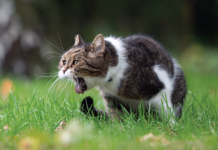Question: I would like to suggest that CatWatch mention the recently recognized role of the protozoal parasite, Tritrichomonas foetus, as a cause of chronic diarrhea in young cats. I have four cats of my own and also foster cats and kittens on occasion for a humane society in my home state of Minnesota. My youngest adoptee is about 15 months old and was found as a severely malnourished kitten weighing only a pound at an estimated age of 10 weeks.
For the last few months he has been suffering from chronic diarrhea, and it is getting progressively worse. Ive done many fecal examinations on him (I am a medical technician at the Mayo Clinic, and I do stool examinations for the cat shelter) and they were all negative. Last night I collected a sample of loose stool from Mouse as it dripped from his anus, and I took it in to take a look under the microscope. The sample was absolutely loaded with the parasite! I showed it to the lead technician in parasitology here at Mayo the next day, and she confirmed it was some sort of trichomonas.
Since then I have been playing telephone tag with my veterinarian and looking up everything I can find on the Internet. From what I can tell, there is not an effective treatment, and hopefully he will eventually grow out of it. I am fairly knowledgeable about cats, but I had never heard of this and my veterinary parasitology manuals do not even mention it. I think it would be a good topic for your newsletter.
Answer: I agree: I think a discussion of this recently recognized cause of intestinal tract disease is quite warranted. But first, its important to realize there are many potential infectious causes (that is, caused by an infection of some sort) of diarrhea in cats. Bacteria, viruses, single- and multi-cellular parasites – and even types of fungi and algae – may be implicated, so a multitude of diagnostic tests might be necessary to find the culprit or culprits.
Diagnostic Directives
The standard fecal flotation method (accomplished by mixing some stool into a solution that makes parasite eggs rise to the surface, collecting a few drops of the liquid at the top, then looking for eggs or cysts with a microscope) is a quick, cheap and reliable way to detect roundworms, hookworms and some protozoal parasites. Im guessing this is the technique you used in your lab at first. But this method will most certainly miss other equally important parasites. Whenever I get the chance, I encourage veterinarians to evaluate the stool in additional ways – methods described quite adequately in veterinary textbooks and scientific publications – so that protozoal parasites (like Giardia, Cryptosporidium and Tritrichomonas foetus) and other infectious agents can be detected. If intestinal parasites are suspected but cant be found, I suggest consultation with a veterinary diagnostic laboratory.
Newly Described…But Probably Not New
Various protozoa have been found in the stool of cats for decades, but only within the last few years has Tritrichomonas foetus (a cause of venereal disease in cattle, and also found in the feces of swine) been identified and proven to be one cause of intestinal disease. Most common in young cats from multiple-cat environments, the diarrhea may persist for days to months, is very smelly and often accompanied by flatus, ranges from a liquid to pasty (cow patty) consistency, and may contain fresh blood or mucus. As with Mouse, involuntary dribbling of feces from the anus is common, and defecation can be painful.
Resolving the disease can be difficult. Youre correct in that no medication has shown itself capable of permanently ridding cats of Tritrichomonas foetus, but a number of drugs seem to make most cats better for reasons that arent completely understood. Caution: cats with diarrhea caused by this parasite should not be housed with other cats, nor should they share litter boxes with others to prevent spread to innocent bystanders. And although transmission from cats to humans has not been documented, the parasite can live in at least several species of animals, so its better to be safe than sorry: Wear gloves when changing the litter box and cleaning away feces, and make sure to wash your hands thoroughly after handling the kitty.
For many reasons, this included, those admirable folks who foster cats for shelters should NOT allow them to share space or mingle with their own cats.



